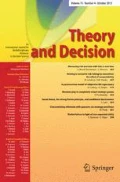Abstract
We conduct a laboratory experiment using the Monty Hall problem to study how simplified examples improve learning behavior and correct irrational choices in probabilistic situations. In particular, we show that after experiencing a simplified version of the MHP (the 100-door version), subjects perform better in the MHP (the 3-door version), compared to the control group who only experienced the 3-door version. Our results suggest that simplified examples strongly induces learning.

Similar content being viewed by others
References
Barron, G., & Erev, I. (2003). Small feedback-based decisions and their limited correspondence to description-based decisions. Journal of Behavioral Decision Making, 16(3), 215–233. https://doi.org/10.1002/bdm.443.
Brokaw, A. J., & Merz, T. E. (2004). Active learning with monty hall in a game theory class. The Journal of Economic Education, 35(3), 259–268.
Chen, W., Liu, S. Y., Chen, C. H., & Lee, Y. S. (2011). Bounded memory, inertia, sampling and weighting model for market entry games. Games, 2(1), 187–199. https://doi.org/10.3390/g2010187.
Dufwenberg, M., Sundaram, R., & Butler, D. J. (2010). Epiphany in the game of 21. Journal of Economic Behavior & Organization, 75(2), 132–143.
Erev, I., & Roth, A.E. (2014). Maximization, learning, and economic behavior. Proceedings of the National Academy of Sciences, 111(Supplement 3), 10818–10825. https://doi.org/10.1073/pnas.1402846111. https://www.pnas.org/content/111/Supplement_3/10818.
Franco-Watkins, A., Derks, P., & Dougherty, M. (2003). Reasoning in the monty hall problem: Examining choice behaviour and probability judgements. Thinking & Reasoning, 9(1), 67–90.
Friedman, D. (1998). Monty hall’s three doors: Construction and deconstruction of a choice anomaly. American Economic Review, 88(4), 933–946.
Gneezy, U., Rustichini, A., & Vostroknutov, A. (2010). Experience and insight in the race game. Journal of economic behavior & organization, 75(2), 144–155.
Granberg, D., & Dorr, N. (1998). Further exploration of two-stage decision making in the monty hall dilemma. The American journal of psychology, 111(4), 561.
Holt, C. A., & Laury, S. K. (2002). Risk aversion and incentive effects. American Economic Review, 92(5), 1644–1655. https://doi.org/10.1257/000282802762024700.
Mengel, F. (2012). Learning across games. Games and Economic Behavior, 74(2), 601–619. https://doi.org/10.1016/j.geb.2011.08.020. http://www.sciencedirect.com/science/article/pii/S0899825611001552.
Page, S. E. (1998). Let’s make a deal. Economics Letters, 61(2), 175–180.
Selvin, S., Bloxham, M., Khuri, A.I., Moore, M., Coleman, R., Bryce, G.R., Hagans, J.A., Chalmers, T.C., Maxwell, E.A., & Smith, G.N. (1975). Letters to the editor. The American Statistician, 29(1), 67–71. http://www.jstor.org/stable/2683689
Stibel, J. M., Dror, I. E., & Ben-Zeev, T. (2009). The collapsing choice theory: Dissociating choice and judgment in decision making. Theory and Decision, 66(2), 149–179.
Tubau, E., Aguilar-Lleyda, D., & Johnson, E. D. (2015). Reasoning and choice in the monty hall dilemma (mhd): implications for improving bayesian reasoning. Frontiers in Psychology, 6, 353.
vos Savant, M., (1997). The power of logical thinking. New York: St Martin's Griffin.
Acknowledgements
This is an extension of Wei James Chen’s master thesis. Yu-Tsong Tai, Yahan Chuang, Ally Wu, Sara Yi-Ping Bai and Vivian Tzu-Fan Own provided excellent research assistance. We thank comments from Daniel Friedman, Chen-Ying Huang, Colin F. Camerer, Walter Yuan, Ching-I Huang, Sheng-Kai Chang, Martin Dufwenberg, Staphanie W. Wang, and the audience of the ESA 2009 International Meeting and North American Regional Meeting. This work was supported by CRETA, National Taiwan University (NTU-107L900203; MOST 107-3017-F-002-004). All remaining errors are our own.
Funding
This work was partially funded by the National Science Council of Taiwan (Grant number NSC 98-2410-H-002-069-MY2, NSC 102-2628-H-002-002-MY4).
Author information
Authors and Affiliations
Corresponding author
Additional information
Publisher's Note
Springer Nature remains neutral with regard to jurisdictional claims in published maps and institutional affiliations.
Rights and permissions
About this article
Cite this article
Chen, W.J., Wang, J.Ty. A modified Monty Hall problem. Theory Decis 89, 151–156 (2020). https://doi.org/10.1007/s11238-020-09757-1
Published:
Issue Date:
DOI: https://doi.org/10.1007/s11238-020-09757-1




